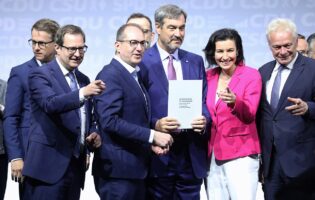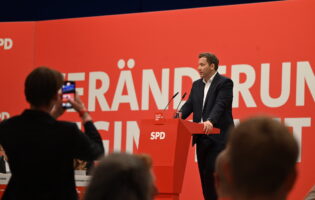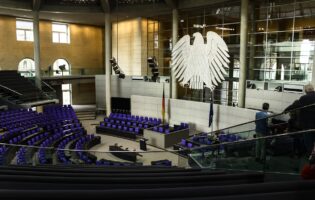AGI News
AGI Welcomes New Fellows for 2020

John Brighenti via Flickr

Jonas J. Driedger
Paul H. Nitze School of Advanced International Studies (SAIS), Johns Hopkins University
Dr. Jonas J. Driedger is a DAAD Postdoctoral Fellow at the Kissinger Center for Global Affairs at the Paul H. Nitze School of Advanced International Studies (SAIS), Johns Hopkins University. At SAIS, Dr. Driedger researches transatlantic options for stability in the neighborhoods of Russia and China. He specializes in the causes of peace and conflict between major military powers and their less powerful neighbors, conflict-averting policy options of third states, the politics of regime survival, deterrence, “hybrid” conflict measures and security cooperation in international relations, with a regional focus on Russia and its relations to its neighboring states, Europe, and the United States.
Mr. Driedger was a Doctoral Researcher at the European University Institute in Florence, Italy. In his dissertation, he assesses the causes of peace and armed conflict between major powers and nearby states with inferior military capabilities. A College of Europe graduate, he was an Alfa Fellow and Visiting Researcher at the Moscow Higher School of Economics. He taught and did fieldwork in Germany, Italy, Ukraine, and Russia. Apart from his academic publications, Jonas contributed analyses and policy advice in German, Russian, and English, including to the George C. Marshall European Center for Security Studies, the Oxford University Changing Character of War Centre, Politico Europe, The National Interest, EUObserver, and EurActiv. His recent article, "Will Russia intervene in Belarus?" was published by the EUIdeas blog.
During his fellowship, Jonas investigated how the Trump presidency had affected U.S.-German security cooperation toward Russia. Were the bitter exchanges between Donald Trump and Angela Merkel indicative of a rapidly widening divergence on Russia? Trump expressed sympathy for Russian president Vladimir Putin, while Merkel, upon Trump’s electoral victory, called for European “strategic autonomy” and made future transatlantic cooperation contingent on adherence to fundamental values. Alternatively, one might well have asked whether these bitter public exchanges covered up that, at the policy level and between key mid-tier policymakers, there was little to no change in how the two countries cooperated toward Russia. These questions were particularly urgent, as Russian conduct was unlikely to become less aggressive. Recent constitutional reforms cemented Putin’s domineering position over Russia and the Kremlin continued assertive policies in Syria, Ukraine, and Western domestic affairs. With the United Kingdom having left the European Union, and France largely focused inward and toward Africa, the United States and Germany emerged as the key linchpin of effective Western policy toward Russia. Managing this relationship well required a thorough understanding of how the Trump presidency had affected it, and what the likely effects of the 2020 elections would be.
The DAAD/AICGS Research Fellowship is supported by the DAAD with funds from the Federal Foreign Office.

Maximilian Ernst
DAAD/AICGS Research Fellow
Maximilian Ernst is a researcher and PhD Candidate in Political Science at the Institute for European Studies of the Vrije Universiteit Brussel (VUB), where he is also affiliated with the KF-VUB Korea Chair. His PhD research seeks to explain Chinese Coercive Diplomacy targeting secondary states in the Asia-Pacific region, specifically how Beijing reconciles the strategic costs of alienating the target states of coercion. Prior to his doctoral studies, Mr. Ernst worked as a Consultant for the Korea Trade-Investment Promotion Agency in Hamburg. He holds an MA in International Security and Foreign Policy from Yonsei University in Seoul and a BA in Chinese Studies from the Johannes Gutenberg University in Mainz.
During his fellowship at AICGS, Maximilian’s research will focus on Chinese security and foreign policy, including economic statecraft targeting U.S. allies both in Asia and in Europe. Building on his PhD research on China’s strategic considerations informing Beijing’s decision to coerce nation states—diplomatically, economically, and militarily—the research at AICGS is set out to identify prospects and opportunities for a transatlantic response to Chinese statecraft targeting U.S. allies. In order to overcome the systemic challenge from China, capitals in Europe, notably Brussels and Berlin, and DC are incentivized to develop a transatlantic China policy that emphasizes the long-term shared interests of the transatlantic community. It is proposed that increased cooperation in key areas such as investment screening, 5G, communications technology, and artificial intelligence bears the opportunity for the transatlantic community to mitigate the adverse economic effects of decoupling, economically and industrially, from China.
The DAAD/AICGS Research Fellowship is supported by the DAAD with funds from the Federal Foreign Office.

Michael Bayerlein
DAAD/AICGS Research Fellow
Michael Bayerlein is a doctoral researcher at the University of Kiel and a research associate at the Kiel Institute for the World Economy. Mr. Bayerlein holds a Master’s degree in Political Science and Public Internal Law from the University of Kiel as well as a Bachelor’s degree in Political Science from the University of Mannheim. His research interests are located at the intersection of political science and economics with a special focus on political economy, party politics, electoral behavior, globalization, and populism, with a strong focus on quantitative methods.
Michael’s dissertation is concerned with the various facets of current and historic electoral breakthroughs and rule of populist parties and politicians. His research specifically centers around the determinants and consequences of populism with a focus on identifying common causes and working out short- as well as long-term ramifications.
During his fellowship at AICGS, Michael will analyze the regional differences in right-wing populist voting in Germany and the U.S. In order to do so, he introduces the concept of “spatial inequality,” which is the relative economic inequality between subnational regions. Using household income data from Germany and the U.S. on the regional revel, Michael develops a measure of relative regional inequality and models this inequality as a determinant of right-wing populist voting in both countries.
The DAAD/AICGS Research Fellowship is supported by the DAAD with funds from the Federal Foreign Office.
AGI is pleased to announce three new fellows selected for the 2020 DAAD/AGI Research Fellowship. Due to the ongoing COVID-19 pandemic, the fellowships will be conducted virtually from October 1 to December 31, 2020.
Michael Bayerlein, Doctoral Researcher at the University of Kiel and a research associate at the Kiel Institute for the World Economy, will analyze the regional differences in right-wing populist voting in Germany and the U.S. during his fellowship.
Jonas Driedger, Doctoral Researcher at the European University Institute in Florence, Italy, will investigate how the Trump presidency has affected U.S.-German security cooperation toward Russia.
Maximilian Ernst, Researcher and PhD Candidate in Political Science at the Institute for European Studies of the Vrije Universiteit Brussel (VUB), will focus on Chinese security and foreign policy, including economic statecraft targeting U.S. allies both in Asia and in Europe.
The DAAD/AGI Research Fellowship is supported by the DAAD with funds from the Federal Foreign Office.









